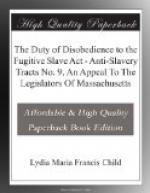Shame on my native State! Everlasting shame! Blot out the escutcheon of the brave old Commonwealth! Instead of the sword uplifted to protect liberty, let the slave-driver’s whip be suspended over a blood-hound, and take for your motto, Obedience to tyrants is the highest law.
Legislators of Massachusetts, can it be that you really understand what Slavery is, and yet consent that a fugitive slave, who seeks protection here, shall be driven back to that dismal house of bondage? For sweet charity’s sake, I must suppose that you have been too busy with your farms and your merchandise ever to have imagined yourself in the situation of a slave. Let me suppose a case for you; one of a class of cases occurring by hundreds every year. Suppose your father was Governor of Carolina and your mother was a slave. The Governor’s wife hates your mother, and is ingenious in inventing occasions to have you whipped. You don’t know the reason why, poor child! but your mother knows full well. If they would only allow her to go away and work for wages, she would gladly toil and earn money to buy you. But that your father will not allow. His laws have settled it that she is his property, “for all purposes whatsoever,” and he will keep her as long as suits his convenience. The mistress continually insists upon her being sold far away South; and after a while, she has her will. Your poor mother clings to you convulsively; but the slave-driver gives you both a cut of his whip, and tells you to stop your squalling. They drive her off with the gang, and you never hear of her again; but, for a long time afterward, it makes you very sad to remember the farewell look of those large, loving eyes. Your poor mother had handsome eyes; and that was one reason her mistress hated her.
You also are your father’s property; and when he dies, you will be the property of your whiter brother. You black his shoes, tend upon him at table, and sleep on the floor in his room, to give him water if he is thirsty in the night. You see him learning to read, and you hear your father read wonderful things from the newspapers. Very naturally, you want to read, too. You ask your brother to teach you the letters. He gives you a kick, calls you a “damned nig,” and informs his father, who orders you to be flogged for insolence. Alone on the hard floor at night, still smarting from your blows, you ponder over the great mystery of knowledge and wonder why it would do you any more harm than it does your brother. Henceforth, all scraps of newspapers you can find are carefully laid by. Helplessly you pore over them, at stolen moments, as if you expected some miracle would reveal the meaning of those printed signs. Cunning comes to your aid. It is the only weapon of the weak against the strong. When you see white boys playing in the street, you trace a letter in the sand, and say, “My young master calls that B.” “That ain’t B, you dammed nigger. That’s




